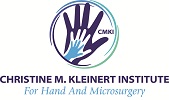“One small step for man one giant leap for mankind” -Neil Armstrong, a Kleinert Kutz patient.
Kleinert Kutz physicians were the first to perform a hand transplant in the United States. This was the first successful hand transplant in the world. Louisville Hand Transplant program was created as a collaboration between CM Kleinert Institute for Hand and Microsurgery, University of Louisville, Kleinert Kutz Hand Care Center, and Jewish Hospital. The core support for the program was through multiple grants received from the Department of Defense and Jewish Hospital Foundation. Kleinert Kutz physicians led by Dr. Warren Breidenbach paved the way for the first hand transplant of the nation. In the successive years Dr. Joseph E. Kutz and later Dr. Tuna Ozyurekoglu led the team to perform a total of 10 hand transplants. The strength of this program comes from the expertise of physicians in hand surgery, and from the training of all the physicians and researchers of vascularized composite allograft transplant that went through this program. The group has the largest clinical experience and has faced multiple challenges successfully over time. This year, in 2021 we are celebrating 22 years of our first hand transplant.
The first successful solid organ transplantation happened in 1954. It took another forty-four years for successful hand transplantation to be achieved. Hand transplant is unique compared to solid organs and even other composite tissue allotransplantations (CTA). Some of the factors unique to CTA over other solid organs are the fact that they improve quality of life and not necessarily add years to lifespan. Secondly the concerns for causing harm by lifelong immunosuppression. Thirdly, hand transplantation is performed in patients who are healthy and unlike solid organ transplantations, do not have chronic medical conditions. Transplanted hands can be amputated, if needed.
The factors behind our group`s consideration to work in the field of hand transplantations were three-fold. Firstly, the hand prosthetics were still in infancy. The functional outcome of a prosthetic device was considered poorer to hand replantation. Secondly, when Hand transplantation was still a concept, several components of CTA, nerves, tendons, skin, bones and joints, vessels, and muscles were being transplanted with good outcome. Thirdly, advances in understanding the immunological basis of rejection led to development of multiple immunosuppression medications.
These factors led our teams to conduct multiple preclinical experiments- rat hind limb allograft model, pig brachial artery based radial forearm osteomyocutaneous flap allograft mode, “Louisville Pig” model were created. The “Louisville Pig” model had the closest resemblance to human hand allograft.
As the preclinical models successfully demonstrated long term graft survival for composite tissue allotransplantation, the clinical trials seemed to be the next logical step. Louisville Hand Transplant team was established by Kleinert Kutz hand surgeons, plastic surgeons, transplant physicians and surgeons along with psychiatrists, pathologists, hand therapists in June 1996. As hand transplant was a novel treatment modality, multiple ethical questions needed to be addressed.
The proposed hand transplant trial was submitted for Institutional Review Board approval. To avoid institutional bias, an Independent Ethics Committees outside our institution was invited to review the protocol. Each candidate underwent a careful psychologic screening by a committee of psychologists, psychiatrists, and social workers. All the potential recipient candidates were required to have at least attempted prosthetic use prior to transplant. This served as an exit plan in case of graft failure. Each patient was asked to select a patient advocate. The patient advocate had a relationship with only the patient and advise him or her throughout the entire process. A thorough public and professional scrutiny was invited by advance announcements of the clinical trial.
The University of Louisville institutional review board and Jefferson County Medical Society Ethics Board approved Hand Transplant clinical trials in July 1998 which opened the doors to patient recruitment and the preparations to make it a clinical reality for America`s first and the world`s longest surviving hand transplant.
The selection committee consisted of hand surgeons, transplant physician, transplant surgeon, coordinator, hand therapists, immunologists, tissue typing director, psychiatrist, psychologist, social worker, and any other specialist (neurologist, dermatologist, etc.) as needed. Each member of the selection committee presents their concerns and recommendations. The final decision is made by the primary investigators of the clinical trial. To date, committee member opinions have been nearly unanimous either for or against listing a specific candidate for transplantation.
Between 1999 and 2016 a total of 10 hand transplants were performed. Two of these were bilateral hand transplants and two of the transplants were at proximal forearm level. Nine of the patients were male and one was female. Our patients achieved good hand function within a year and their functional status measured by Carroll test, grip strength, sensibility continued to improve for about 6 years. Currently there are 5 patients in the program that are followed for their functional status and immunological wellbeing 2 of the hand transplant patients deceased and 3 patients underwent removal of the transplanted grafts due to complications.
Unfortunately, the program experienced multiple limitations as well. The most apparent one was the inadequacy of the grants, financial and administrative support to the program. The financial failure of the partnering private hospital system, dependency on grants for salaries of research personnel, lack of support from the insurance industry and insufficient private donations to the institute forced the physicians to reevaluate the program. The funding issues, the number of complications, and the new developments in the field of prosthetic replacement of the hand were discussed.
In December 2019, the hand surgeons of the program decided to suspend the hand transplant procedure and transfer the current patients to another well sponsored program. The Louisville VCA program is now under the patronage of the University of Louisville Transplant Program and the group remains as a consult to the patients. No prospective patients are currently enrolled in the program.




